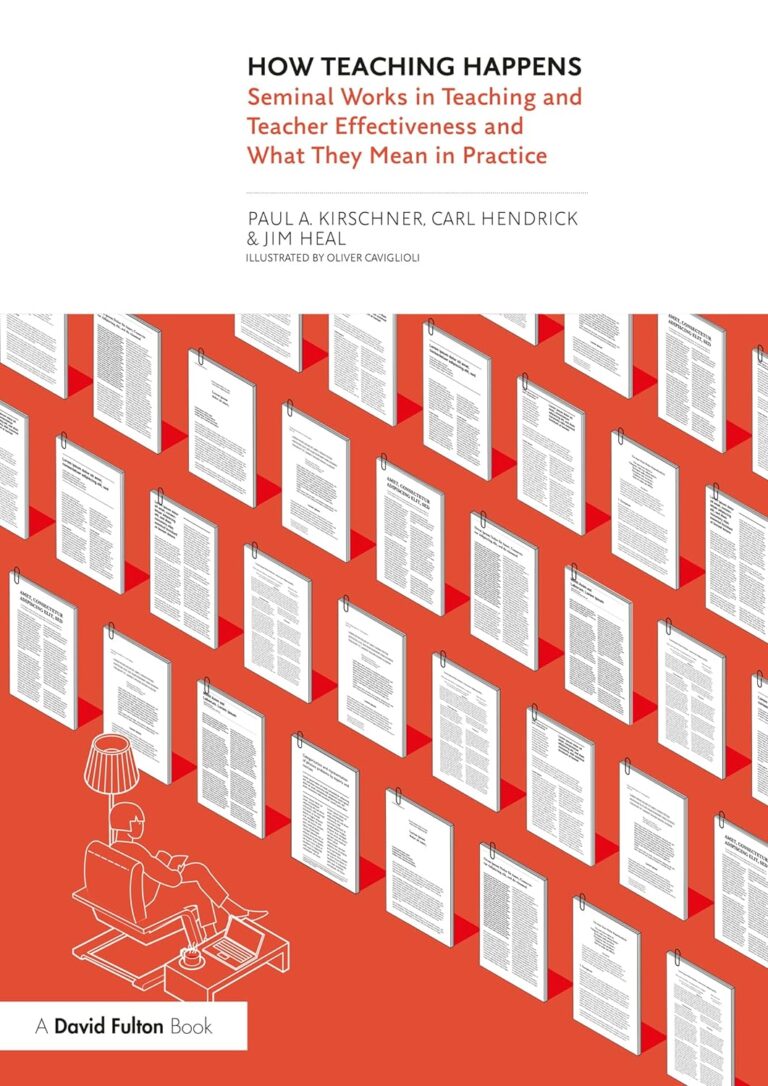Mosaic Book of the Term Prize Draw
Autumn 2023

Written by Rob Caudwell, Co-Founder of Penrose Education
31 October 2023
At Penrose Education we are on a mission to fill the (teacher training) world with thoughtfully designed and effective EdTech. But we also want to fill the (teacher training) world with books.
Each term we will be reviewing a book we have found helpful, interesting and/or thought-provoking in our attempts to develop our understanding of what exceptional teacher training looks like.
Best of all – you could win a copy of one of these books in our Book of the Term Prize Draw!
Our chosen book this term is: How Teaching Happens: Seminal Works in Teaching and Teacher Effectiveness and What They Mean in Practice (2022), by Paul A. Kirschner, Carl Hendrick and Jim Heal.
Why we chose this book?
This book is a follow-up to Kirschner and Hendrick’s earlier book “How Learning Happens” (which is also definitely worth a read, you can buy it here), and it follows the same structure of it’s predecessor. The authors have selected what they deem to be 30 of the most important pieces of research into the practice of teaching. Each chapter is dedicated to one of these, where the authors first summarise the paper or book, before giving suggestions for how it could shape or influence a teacher’s daily practice.
In the preface, the authors readily admit that one of the challenges of writing this book was deciding which pieces of research to select for this “anthology” of educational research. While there may be some chapters you feel less worthy of inclusion – or you may feel aggrieved that some of your favourite pieces of research didn’t make their cut – the collective impact of the 30 chapters that the authors did select is an impressive one. And crucially, not only is the content helpful, but the format of delivery is something that those working in teacher education and training can all learn from – both of which will be discussed further below.
"We... dedicate the book to all teachers around the world. You are members of one of the most difficult, most important, and greatest professions there is. It's our hope that this book will be of some help for you to do your job even better."
- p vii (dedication page)
What we've taken from it
One of the reasons that the authors have written the book is because they believe it unacceptable for those in the teaching profession to ignore the growing research base around effective teaching practice. However, they are also careful not to swing too far the other way, and overstate what can be learnt from any specific research project. My first takeaway from this book is its repeated claim that authentic engagement with the teaching profession’s evidence base requires nuance.
"The world of the classroom is complex and nuanced in ways that are easy to gloss over. Indeed, it's even tempting for teachers to assume something closer to a caricatured version of themselves because more nuanced approaches are harder to understand and enact."
- p 239
"... there is no such thing as a hard and fast rule for 'what always works', but there are teacher behaviours that tend towards more positive outcomes for student learning... The challenge for any teacher should be about how to integrate effective behaviours into an ever-evolving model of what it means to be good at teaching."
- p 38, original emphasis
Despite their commitment to ending each chapter with practical ways that teachers can apply the findings of a given paper or book, the authors are quick to highlight the limits or caveats behind any recommendation. Each chapter carefully unpacks how the research was conducted and what it can and cannot tell us about how to improve teaching practice. As a result, findings are rarely (if ever?) presented as things that will always work everywhere. Instead, the reader is positioned as the person who has to decide how they will use each piece of the evidence base to change their practice – or justify why they won’t!
Where appropriate, the authors also highlight where findings are contested. There are instances where different chapters conclude slightly contradictory things – and the reader is again left to weigh up these separate conclusions. The authors also don’t shy away from outlining how research findings might intersect with – or come into conflict with – wider ethical, political or structural elements around the teaching profession. This is perhaps most obvious in the chapters on the theme of ‘assessment’. Together, the book feels like a mature and honest explanation of the papers and books it is trying to summarise. It avoids over-simplifying complex findings for the sake of easy transmission. Instead, it embraces the nuanced thinking demanded by the evidence-base itself.
A second takeaway is the book’s wonderful – if occasionally dizzying – reminder of how complex a task teaching is, and the breadth of knowledge that can reasonably be included in the category of ‘things that would be helpful for teachers to know’. Across its thirty chapters, the book draws on a wide range of sources, authors and even fields. The book obviously summarises some of the literature around cognitive science, memory and pedagogical design. But it also draws from research in psychology, performance assessment and measurement, professional identity, technology, human relationships, etc. And that’s before you even begin unpacking subject-specific evidence-bases (Section 4 of the book!).
Helpfully, there are also a few chapters (particularly 5, 6 and 16) explicitly focused on what it means for a teacher to navigate the vast knowledge base underpinning the profession. There is no way for teachers to know everything they could know, or apply every possible research finding into their practice. However, it is also unrealistic to expect teachers (or at least most of the teachers I know!) to unquestioningly, uncritically follow instructions and ideas inherited from policymakers, researchers or training providers. So, teachers absolutely need ways to access and understand the relevant research available to them, but they also need meta-strategies for reflecting on and improving their practice in response and relation to this evidence-base. Many of the book’s chapters emphasise that there is normally no “best” way to do something, but teachers can still “get better” if they are encouraged to develop reflective, self-regulated habits of improvement.
"The model proposed by Muijs and the theories that underpin it remind us to resist fixed notions of 'best practice' in teaching. It does so by positioning research and evidence not as a monolithic body of knowledge but rather as the flow of ideas and data that teachers can use and infuse into an ever-evolving mental model for teaching... For Muijs, teachers can and should think for themselves."
- p55.
The third thing I that I really appreciated about this book is the approach it has taken in presenting its content. Probably in light of the above, the authors have absolutely not attempted to create a totally cohesive, step-by-step guide for how to become the perfect teacher (in fact chapter 16 explicitly warns of the folly of trying to do this!). Instead it feels more like a toolbox, a selection of useful findings that teachers can process, experiment with and reflect on. Some of the chapters explicitly highlight the importance of teachers critically and reflectively engaging with questions about how to improve their practice. However, even where this isn’t explicit, it is implicit throughout: the evidence base underpinning the teaching profession cannot be translated into simple instructions that teachers should simply follow. The book’s format celebrates the complex, nuanced, honest – and yet still hugely important – role that research should play in the development of the teaching profession.
The structure also lends itself to being an incredibly useful reference resource. While I enjoyed reading it from cover to cover, its design makes it easy to dip in and out of it too (which I have found myself doing regularly since first reading it). The content is organised thematically, with short summaries followed by longer explanations, then ending with “key takeaways”. Finally, the “suggested readings and links” section at the end of each chapter are treasure troves of extra research papers, blogs, videos and ideas for those who really want to get stuck into a specific topic. But be warned, they can make reading the book a much longer than expected endeavour, as you are forever disappearing off to read another paper or watch a keynote presentation!
We’re delighted to announce that How Teaching Happens has been awarded the @AECT Research & Theory Division's (RTD) Outstanding Book Award. Congratulations to the authors @P_A_Kirschner, @C_Hendrick and @HealJim! 🏆https://t.co/vwYuGoGhTR#WorldTeachersDay #EduTwitter #edchat pic.twitter.com/hPmHUBVKAH
— Routledge Education Books (@RoutledgeEd) October 5, 2023
How Mosaic supports teacher training, education and development
At Penrose Education, we are committed to creating thoughtful and powerful technology to support and improve teacher training, education and development. We build in dialogue and partnership with the sector, embracing diversity in approach and strive to reflect this is in the online solutions we provide.
Mosaic – the ITE platform – is our online solution for the streamlined management of successful teacher training and development, providing an easy-to-use space for trainees, mentors and staff to record, track and personalise every element of the trainee journey; seamlessly encouraging critical reflective practice; supporting highly effective mentoring practice; and all within the wider framework of each provider’s own curriculum.
Our other online platform – Mosaic for Appropriate Bodies is our solution for the effective management and monitoring of ECT progress. Mosaic’s unique automation tools, customisable reporting mechanisms and smart analysis tools ensure all ECTs are supported appropriately in their individual journeys while reducing workload.
If you would like a closer look at either platform or an informal chat please get in touch.
How can I win a copy?
We are giving away three copies of Kirschner, Hendrick and Heal’s book to anyone working in positions related to teacher training and development.
Click the button below to be in with a chance to win.
We will randomly select the lucky winners on the 11th of December. Entries will close 11:59pm on the 8th of December.

